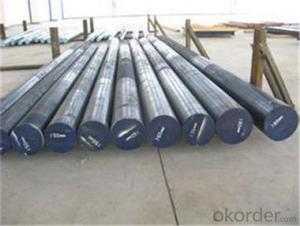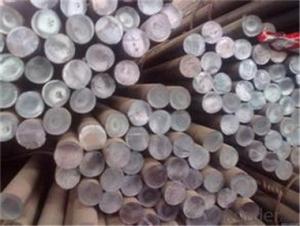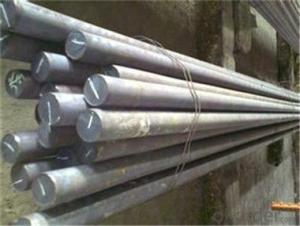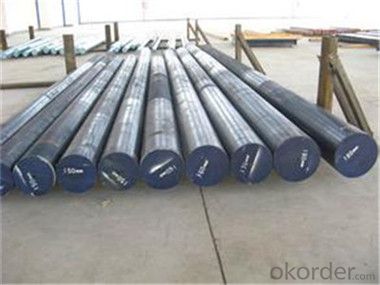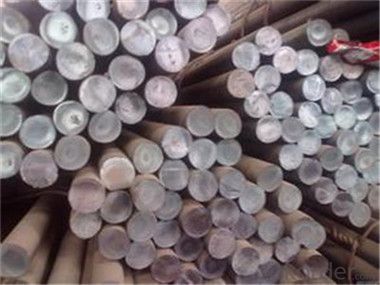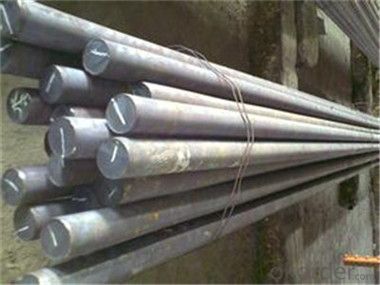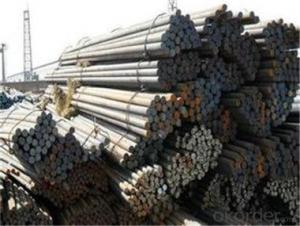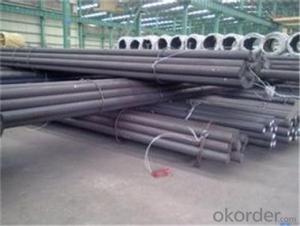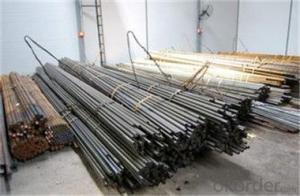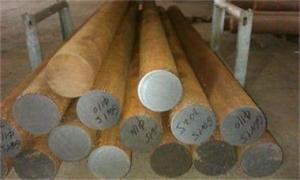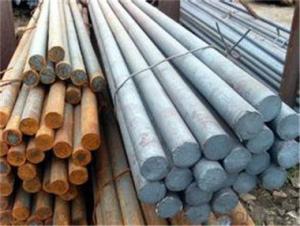Hard Chrome Carbon Round Bar with Good Quality-CNBM
- Loading Port:
- Tianjin
- Payment Terms:
- TT OR LC
- Min Order Qty:
- 60 m.t.
- Supply Capability:
- 2000000 m.t./month
OKorder Service Pledge
OKorder Financial Service
You Might Also Like
Description of steel round bar:
1.Diameter 80 to 800 mm
2.Black or Bright surface
Festures of steel round bar:
4340 Forged Round Steel Bar
1.Dia 80-800mm Length:2000-13000mm or as required
2.Technique:Forged
3.Delivery Time:45 days
Specifications of steel round bar:
Description |
Carbon Steel Rod/Carbon Steel Bar,carbon steel rod,carbon steel shaft,mild steel bar, mild steel shaft,ms bar | |
Material | ASTM | 1005,1006,1008,1010,1015,1020,1025,1030,1035,1040,1045,1050,1055,1060,1065,1070,1080,1084, 1016,1022 |
DIN | Ck10,Ck15,Ck22,Ck25,Ck30,Ck35,Ck40,Ck45,Ck50, 30Mn4,40Mn4 | |
BS | 040A04,095M15,045M10,080A40,045M10,080M50 | |
Standard | GB/T799,ASTM A29,A108,A321,A575,BS970,DIN1652,JIS G4051 | |
Section shape |
Round | |
Length |
As your required | |
Application | Carbon steel rod applies to chemical industry, shipping industry, manufacturing industry,construction,decorate Industry,electric power, pump shafts, sanitary wares,furniture handles,boiler,high temperature resistant,low temperature resistant, corrosion resistant. | |
Images of steel round bar:
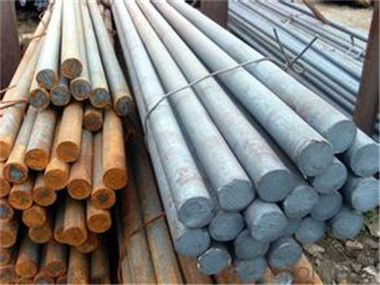
FAQ:
1. What is your package?
Packing situation: standard seaworthy packing or as customer required.
2. How long is the lead time?
Delivery time: 45 days after order confirmed.
- Q: What are the advantages of using duplex steel round bars?
- Duplex steel round bars offer numerous benefits for various applications. Firstly, they provide exceptional resistance to corrosion. By combining chromium, nickel, and molybdenum, this steel can withstand harsh conditions found in marine and chemical industries. This makes it ideal for high exposure to corrosive elements. Secondly, duplex steel round bars possess great strength and toughness. The unique microstructure of this steel, combining ferrite and austenite phases, results in greater strength compared to traditional stainless steels. This makes them suitable for demanding applications requiring high load-bearing capacities. Additionally, duplex steel round bars exhibit excellent fatigue resistance. This makes them perfect for applications subjected to cyclic loading or dynamic stress, such as structural components or machinery parts. Their fatigue resistance allows for extended service life and reliability. Another advantage of using duplex steel round bars is their superior weldability. Their balanced chemical composition and microstructure enable easy fabrication and joining, reducing production time and costs in various industries. Furthermore, duplex steel round bars demonstrate exceptional resistance to stress corrosion cracking (SCC). This makes them a preferred choice for applications with a high risk of SCC, such as offshore and oil and gas industries. Lastly, duplex steel round bars provide cost-effective solutions. Despite their superior properties, they are often more cost-effective than other high-performance materials. Their long service life, reduced maintenance requirements, and overall durability contribute to lower lifecycle costs, making them an economical choice for various applications. In conclusion, duplex steel round bars offer excellent corrosion resistance, high strength and toughness, good fatigue resistance, superior weldability, resistance to stress corrosion cracking, and cost-effectiveness. These properties make them a preferred choice for industries such as oil and gas, chemical processing, marine, and structural applications.
- Q: What are the typical price ranges for steel round bars?
- The price of steel round bars can differ depending on multiple factors, such as the steel type, diameter, length, and quantity purchased. Generally, common carbon steel grades can be priced between $1 and $5 per foot. However, specialty and high-grade steel round bars can have higher prices, ranging from $5 to $20 per foot or more. Moreover, larger diameter or longer length steel round bars may also be more expensive due to increased material and manufacturing costs. It is important to note that these price ranges are approximate and can vary depending on market conditions, supplier pricing, and other factors. To obtain an accurate price range, it is advisable to contact steel suppliers or distributors for specific quotes based on your requirements.
- Q: Can steel round bars be used for making agricultural equipment or machinery?
- Yes, steel round bars can be used for making agricultural equipment or machinery. Steel is a commonly used material in the construction of such equipment due to its high strength, durability, and resistance to wear and tear. Steel round bars can be used to manufacture components like axles, shafts, handles, and structural supports, providing the necessary strength and reliability required for agricultural applications.
- Q: Can steel round bars be used for construction purposes?
- Yes, steel round bars can be used for construction purposes. They are commonly used for structural applications such as building frames, bridges, and various types of infrastructure due to their strength, durability, and versatility. Steel round bars provide a reliable and cost-effective solution for construction projects.
- Q: Are steel round bars resistant to chemicals or acids?
- Steel round bars are generally resistant to most chemicals and acids. However, their resistance may vary depending on the specific type of steel and the concentration and nature of the chemical or acid being used. Stainless steel round bars, for example, are highly resistant to corrosion and many types of acids, making them suitable for use in various industries including chemical processing, food processing, and pharmaceuticals. However, it is important to note that some aggressive chemicals and acids, such as hydrochloric acid or sulfuric acid at high concentrations, can still cause corrosion or damage to steel round bars. In such cases, it is advisable to consult with experts or refer to specific material compatibility charts to determine the most suitable steel alloy for the intended application.
- Q: How are steel round bars used in the manufacturing of heat exchangers?
- Steel round bars are commonly used in the manufacturing of heat exchangers due to their unique properties that make them suitable for this application. Heat exchangers are devices that transfer heat between two or more fluids, and steel round bars play a crucial role in their construction. One major use of steel round bars in heat exchangers is for the fabrication of the heat exchanger tubes. These tubes are responsible for carrying the fluids that need to be heated or cooled. Steel round bars are often used as the base material for these tubes due to their high strength and excellent heat transfer properties. The round shape of the bars allows for easy fabrication of the tubes, ensuring a tight and secure fit. Additionally, steel round bars are used to construct the headers and tube sheets of heat exchangers. The headers are the component that allows the fluid to enter and exit the heat exchanger, while the tube sheets hold the tubes in place. These components require high strength and durability to withstand the pressure and temperature differentials that occur during heat exchange. Steel round bars provide the necessary strength and stability to ensure the proper functioning of the heat exchanger. Furthermore, steel round bars are also used in the manufacturing of the support structures or frames of heat exchangers. These structures provide stability and support to the heat exchanger components and ensure proper alignment and positioning. Steel round bars offer excellent structural integrity and can withstand heavy loads, making them ideal for this purpose. In conclusion, steel round bars are an integral component in the manufacturing of heat exchangers. Their high strength, excellent heat transfer properties, and durability make them suitable for fabricating the tubes, headers, tube sheets, and support structures of heat exchangers. By utilizing steel round bars, manufacturers can ensure the efficiency, effectiveness, and longevity of heat exchangers in various industries, such as power generation, chemical processing, and HVAC systems.
- Q: How do steel round bars perform under torsion or twisting forces?
- Steel round bars are known for their excellent performance under torsion or twisting forces. Due to their inherent strength and stiffness, steel round bars are capable of withstanding high levels of torque without significant deformation or failure. When subjected to torsion, steel round bars exhibit a phenomenon known as elastic behavior. Initially, the bar will twist and deform elastically, meaning it will return to its original shape once the twisting forces are removed. This elastic deformation is proportional to the applied torque, following Hooke's law. However, if the torsional forces exceed the elastic limit of the steel round bar, it will undergo plastic deformation. This means that the bar will permanently twist and will not return to its original shape once the forces are released. The amount of plastic deformation depends on the magnitude and duration of the torsional forces. Steel round bars are highly resistant to torsional failure due to their high tensile strength, which allows them to withstand significant twisting forces. Additionally, the smooth and uniform surface of the round bars reduces the likelihood of stress concentrations, further enhancing their torsional performance. It is important to note that the performance of steel round bars under torsion can be influenced by factors such as alloy composition, heat treatment, and manufacturing processes. By selecting suitable grades of steel and employing appropriate processing techniques, the torsional strength and performance of steel round bars can be further optimized to meet specific application requirements.
- Q: Can steel round bars be used for making heat exchangers?
- Yes, steel round bars can be used for making heat exchangers. Steel is a commonly used material for heat exchangers due to its good thermal conductivity, strength, and resistance to corrosion. Round bars can be machined and formed into the desired shape for the heat exchanger, providing structural integrity and efficient heat transfer.
- Q: How do steel round bars compare to fiberglass round bars?
- Steel round bars and fiberglass round bars have different properties and characteristics, making them suitable for different applications. Steel round bars are known for their high strength and durability, making them ideal for heavy-duty applications such as construction, machinery, and automotive industries. They have a higher tensile strength and can withstand more stress and load compared to fiberglass round bars. On the other hand, fiberglass round bars are lighter in weight, have excellent corrosion resistance, and are non-conductive, making them suitable for applications that require electrical insulation or resistance to chemicals. Ultimately, the choice between steel and fiberglass round bars depends on the specific requirements of the project or application.
- Q: Can steel round bars be bent or formed into shapes?
- Yes, steel round bars can be bent or formed into shapes. Steel is a highly versatile material with excellent strength and durability, making it suitable for various applications. To bend or form steel round bars, various techniques such as heating, hammering, or using specialized machinery like hydraulic presses or roll benders can be employed. These methods allow the steel bars to be shaped into curves, angles, or specific forms to meet the desired requirements. However, it is important to note that the extent to which a steel round bar can be bent or formed depends on factors such as the diameter, type of steel, and the specific bending/forming technique used.
Send your message to us
Hard Chrome Carbon Round Bar with Good Quality-CNBM
- Loading Port:
- Tianjin
- Payment Terms:
- TT OR LC
- Min Order Qty:
- 60 m.t.
- Supply Capability:
- 2000000 m.t./month
OKorder Service Pledge
OKorder Financial Service
Similar products
Hot products
Hot Searches
Related keywords
